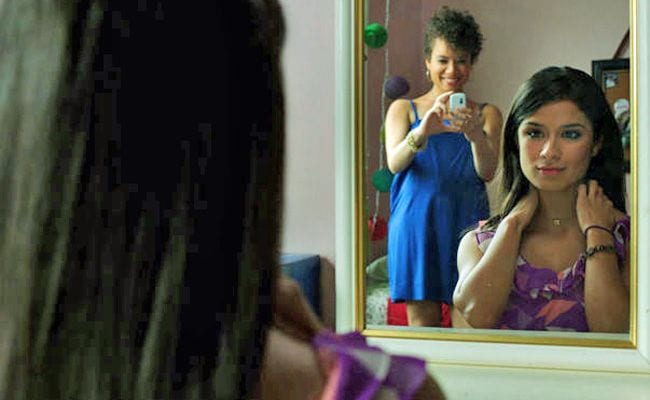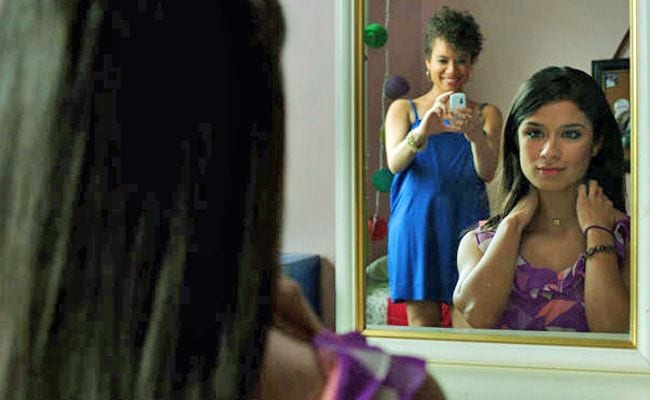
“I think we’re all just trying to find ways to simplify our emotions so that we can share them,” says Elena (Livia De Paolis). Her graduate school advisor (Carol Kane) nods, as they discuss Elena’s “modern means of communication” research. Both her project and Livia De Paolis’ film Emoticon 😉 delve into our dependence on digital means of communicating, like texting, video calling, and social networking sites. While Elena suggests that these means can simplify our emotions and experiences, the film does the opposite, complicating its storytelling and trying to do too much.
Even in its opening credits sequence, Emoticon 😉 overstimulates, as neon, 3D-animated bubbles resembling molecular structures fill the screen. Swift pans and zooms out reveal that these circles represent the pixels that make up video images of characters we are about to get to know. These videos are pixilated and jerky, an online-streaming effect suggesting the most annoying aspects of such communication, a point that’s already overstated.
The gimmicky visuals only underline the thinness of the story, which De Paolis has co-written (she also directs and produces, and even contributes to the soundtrack score). Elena is a graduate student living in New York who begins dating a much older boyfriend, Walter Nevins (Michael Cristofer). The film opens as she meets his two adopted children, Amanda (Dianne Guerrero) and Luke (Miles Chandler), soon revealed to be familiar types. Luke has a predictable coming-of-age experience while Amanda is written as a selfish, misunderstood teenager experiencing an identity crisis. They (and we) might be grateful for Elena, who provides some emotional balance and advice, but she can’t help the rest of the banal script and underdeveloped relationships.
Frequently conveyed via Internet conversations (displayed by close-ups of phone and laptop screens), these relationships tend also toward the superficial. Communicating by texting, don’t you know, can be ambiguous, and lead to misunderstandings. At first it appears that Elena is aware of the dilemma: when she and the kids go sightseeing in Mexico, she instructs Luke, “Turn that camera off. Look at it without any filters. Just… look at it.”
As much as this moment might feel helpful, it also leads to another, decidedly less persuasive. As Elena tries to get to know Amanda, an unsurprising tension develops: after one falling out, Elena tries to reconcile, recalling the Mexico trip: “I saw the pictures on Facebook of Mexico.” Amanda sighs, “Oh… do you want me to tag you?” When Elena suggests this is up to Amanda, the teenager concedes, “I’ll tag you.” Even as they both smile and nod in silent agreement, we’re not quite convinced that this is all it takes for them to make up.
Such lapses in emotional logic might offer a critique of the problems with digital communication, but they also demonstrate another sort of problem, that Emoticon 😉 has its own problems with communication, using characters as occasions for various critiques. Just so, it uses Luke to take aim at another means of digital communication, amateur music videos. An aspiring musician, he posts videos of himself playing guitar in front of the computer to Youtube and Facebook.
Less understandably, he also seeks Elena’s help in songwriting, specifically lyrics. The two eventually come up with a single, “I Catch On Pretty Fast,” which only suggests that no one is catching on to anything. “You know, I know you know a little bit more than I do,” the song begins, “Tell me what I need to know…. You did the original, but we can do the sequel.” If this subplot serves as a bonding moment between Elena and Luke, it is also, for us, cheesy, making it harder for us to connect with Elena’s efforts to connect with Luke.
This again is the film’s central dilemma, that as it might criticize current lapses in communication, it also enacts them. As it uses Elena’s research into the effects of digital exchanges, the limits imposed by advancing technologies as plot and theme, Emoticon 😉 remains limited. While it obviously supports Elena’s suggestion that we “simplify” in order to communicate more easily, to “just look”, without filters, its own many filters are repeatedly distracting.


![Call for Papers: All Things Reconsidered [MUSIC] May-August 2024](https://www.popmatters.com/wp-content/uploads/2024/04/all-things-reconsidered-call-music-may-2024-720x380.jpg)



